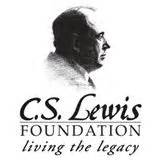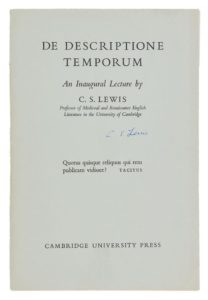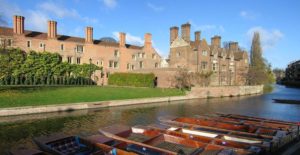 I watch from afar (via Facebook posts) those who are participating in the C. S. Lewis Foundation’s Oxbridge conference. I already had my England trip this summer; couldn’t afford this one.
I watch from afar (via Facebook posts) those who are participating in the C. S. Lewis Foundation’s Oxbridge conference. I already had my England trip this summer; couldn’t afford this one.
It’s nice to relive, through the posts, some of the spots I visited earlier, especially the Kilns. The conference now moves on from Oxford to Cambridge, where Lewis taught in the last decade of his life. I’ve never been there; my bucket list is not yet emptied.
Moving from Oxford to Cambridge was hard for Lewis, even though he was offered a chair created with him in mind, and despite the poor treatment he received at Oxford, primarily from those who could never forgive him for wading into “religious” writing.
At first, he declined the invitation to teach at Cambridge. He was concerned about moving out of the Kilns after making a life there. At the urging of Tolkien and with the permission of Cambridge, he was able to keep the Kilns as his residence and take the train to Cambridge during the week.
 His inaugural lecture created a sensation. In it, he spoke of the loss of the heritage of the past. He famously described himself as a dinosaur from whom others might still learn.
His inaugural lecture created a sensation. In it, he spoke of the loss of the heritage of the past. He famously described himself as a dinosaur from whom others might still learn.
If a live dinosaur dragged its slow length into the laboratory, would we not all look back as we fled? What a chance to know at last how it really moved and looked and smelled and what noises it made! . . .
Speaking not only for myself but for all other Old Western men whom you may meet, I would say, use your specimens while you can. There are not going to be many more dinosaurs.
 When he made the actual physical move, transferring all his books to the new university, it took him a while to adjust. Joy Gresham, not yet his wife, helped with the move. As I wrote in my book, America Discovers C. S. Lewis (accessed here),
When he made the actual physical move, transferring all his books to the new university, it took him a while to adjust. Joy Gresham, not yet his wife, helped with the move. As I wrote in my book, America Discovers C. S. Lewis (accessed here),
To some friends she wrote of how Lewis was adapting to the move, revealing the emotional wrench it was for him at first, even though he handled his uneasiness with his usual sense of humor:
“Poor lamb, he was suffering all the pangs and qualms of a new boy going to a formidable school—went around muttering, ‘Oh, what a fool I am! I had a good home and I left!’ and turning his mouth down at the corners most pathetical. He always makes his distresses into a joke, but of course there’s a genuine grief in leaving a place like Magdalen after thirty years; rather like a divorce, I imagine.”
Lewis, according to those who knew him at Cambridge, came to love the place. As he wrote to another correspondent, Mary Willis Shelburne, about his new Magdalene College,
It’s a tiny college (a perfect cameo architecturally) and they’re so old fashioned, and pious, and gentle and conservative—unlike this leftist, atheist, cynical, hard-boiled, huge Magdalen. Perhaps from being the fogey and “old woman” here I shall become the enfant terrible there.
I would be interested in knowing if Lewis’s perception of the distinction between Oxford and Cambridge remains today.
Meanwhile, as I enjoy others’ experiences from my vantage point across the ocean, running through my mind is one thought: Oxbridge 2020.
